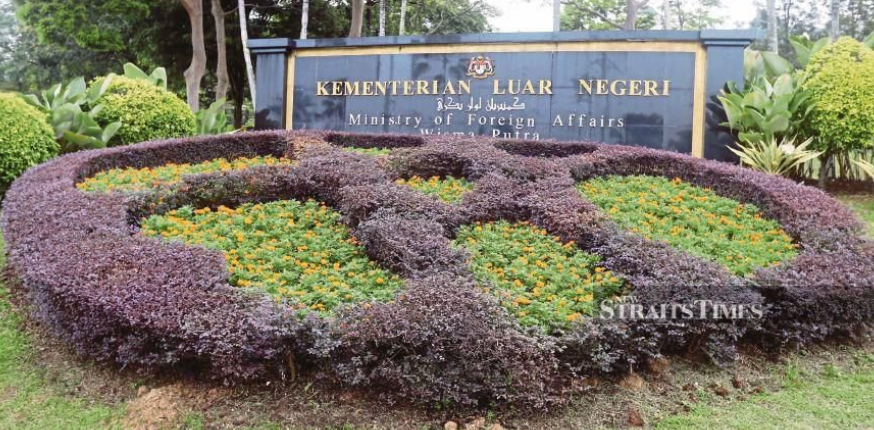NEITHER failure, overachievement nor decisions made through Malaysia’s foreign policy have attracted numerous mixed reactions from both at home and abroad.
While no one expected a perfect report card, some of the approaches we’ve taken to express our national interests and values do leave a lot to be desired.
The international environment is evolving in ways that are leaving us less able to predict what’s going to happen and even less capable to act in our benefit.
These include changes affecting our position on matters such as the rights of the oppressed like the Rohingya and Palestinians; to our actions in handling great power rivalry, membership to an alphabet soup’s worth of international organisations, transboundary haze and even plastic waste shipments.
It’s important to note that no country operates in isolation, and that includes Malaysia.
We thrive off global interconnectivity and, as a trade dependent country, being proactive towards securing friendly relations and participating in ways to ensure peace and stability are one of the key ways to ensure our own prosperity and development.
The recent announcement of the Foreign Policy Framework by Prime Minister Tun Dr Mahathir Mohamad on Sept 18, 2019, does provide a chance to shine a somewhat dim spotlight on the future direction of our foreign policy.
While there are ambitious ideas, it doesn’t address the elephant in the room — how little we’ve done to address fundamental and recurring issues.
How are we expected to achieve our national interests abroad while using such a contextually specific playbook?
Our foreign policy has long been rooted in historical legacies, by the combined influences of the personalities, backgrounds and leadership styles of our past prime ministers.
It left a somewhat stagnant organisational culture with an elite dominated process and little domestic input and pressures.
While not necessarily as obvious as it was during the time of Tunku Abdul Rahman, this culture still exists.
Even with the return of Dr Mahathir, we are seeing the return of policies that were the set pieces of his international engagements from his first tenure in office with varying levels of relevance for the world we live in today.
The general slogan of the current Framework, “Change in Continuity,” unfortunately does not paint a flattering picture of how foreign policy works to make Malaysia a friendly, neutral and pragmatic country.
Like much of the efforts, they have long been plagued by the same issues revolving around the shortage of funds and qualified manpower to avoid rehashing old ideas in hopes they produce some desirable result.
To put this in perspective, the Ministry of Education was allocated the highest portion of the budget this year, taking up almost 20 per cent. On the other hand, the Foreign Ministry is scraping by with 0.2 per cent.
This is no comforting fact, when realising that this amount is expected to not only fund the ambitious initiatives listed in their framework, but fulfil other roles such as maintaining diplomatic missions in over a hundred countries and the general administrative upkeep.
That being said, this does not mean it is a lost cause.
There is still merit in the strategy to remain with the goals and objectives that exists for as long as this country has been independent.
What is important to recognise is that we need to start shifting our strategy in achieving similar, if not better, results.
Past attempts of our foreign policy mechanisms and institutions have not been keeping pace with expectations and demands of time and it clearly shows.
FIRSTLY, there needs to be a realignment towards more selective and strategic engagements.
The goals we strive for the country and its international environment cannot be piled together in a muddled list. Given budgetary constraints, our aspirations need to be framed with achievable objectives that can present us with tangible benefits.
Such is the case in our relations with stronger powers such as the United States and China, where our actions need to be carefully prepared to mitigate negative effects on Malaysia while maintaining enough friendly relations to avoid repercussions on areas such as our trading opportunities.
SECONDLY, there needs to be an overhaul of the organisational culture that drives the Foreign Ministry.
A coherent structure is necessary for the deeper understanding of the interconnectivity of domestic and external priorities and the sort of coordination necessary.
An example would be greater coordination with other ministries that share relevant international involvement to streamline tasks to be mutually beneficial and avoiding bureaucratic redundancies.
THIRDLY, we cannot forget the importance of developing and improving human resources.
They are the foundation for the successful delivery of our foreign policy, but there is little appreciation of the various sources of information that can contribute towards a more holistic understanding of the world around us.
These include the appropriate training not only limited to matters of foreign policy, such as language proficiency and cultural awareness, but working beyond that to create well-rounded individuals representing the country. Malaysia has been oddly fortunate to be on the edge of most major developments in the international environment.
Yet, our small status should not excuse the lack of proactive measures taken by our decision makers. Reactive responses and inactivity dismissed on the grounds of neutrality is not the same as pragmatism.
Whether we like it or not, no matter how far away some of these problems may seem, they can still affect the country in ways that we may not expect and we need to be prepared for that.
This article first appeared in the New Straits Times on October 1, 2019





